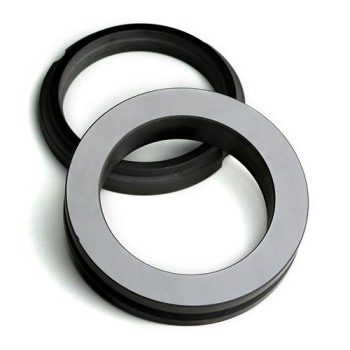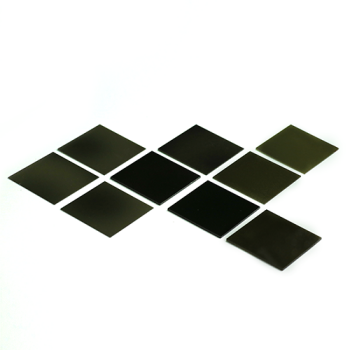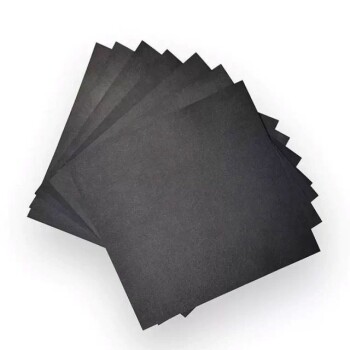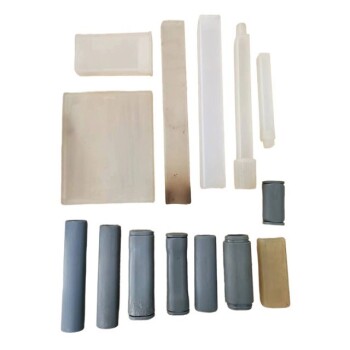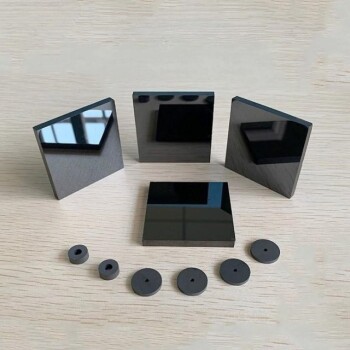In short, DLC coating is a premium service with a price that reflects its complex application process and high-performance characteristics. For consumer goods like a watch case, knife blade, or firearm slide, expect the coating process alone to add anywhere from $100 to over $500 to the final cost. The price is dictated by the part's size, geometric complexity, required preparation, and the specific type of DLC being applied.
The cost of Diamond-Like Carbon (DLC) coating is not for the raw material itself, but for the sophisticated, multi-stage process. You are paying for meticulous surface preparation, the use of expensive vacuum deposition machinery, and the technical expertise required to create a permanent, atomically-bonded layer that fundamentally enhances the object's performance.

What Drives the Cost of DLC Coating?
To understand the price, you must first understand the process. DLC isn't painted or dipped; it's created on the surface of an object atom by atom inside a vacuum chamber. Each step adds to the final cost.
The Critical Preparation Stage
Before coating can begin, the substrate (the part's surface) must be atomically clean. Any imperfection or contaminant will cause the coating to fail.
This stage is labor-intensive and includes processes like degreasing, ultrasonic cleaning, and often abrasive blasting to create a uniform surface.
The High-Tech PVD Process
DLC is applied using Physical Vapor Deposition (PVD) in a high-vacuum chamber. This equipment is a significant capital investment, costing hundreds of thousands of dollars.
Running these machines requires a controlled environment, specialized gases like argon and acetylene, and significant energy consumption, all of which contribute to the operational cost.
Part Complexity and Masking
A simple, flat object is far easier and cheaper to coat than a complex one with many angles and internal surfaces.
If certain areas must remain uncoated (like threads or critical tolerance surfaces), they must be painstakingly masked by hand. This precise, manual labor can significantly increase the price.
Batch Size and Volume
The economics of running a PVD chamber heavily favor large batches. Coating a single, one-off part is disproportionately expensive because the entire machine cycle must be run just for that piece.
This is why industrial-scale orders for thousands of drill bits have a low per-unit cost, while a custom project for a single watch is very high.
How DLC Compares to Other Coatings
Understanding DLC's value requires comparing it to common alternatives.
DLC vs. Cerakote
Cerakote is a spray-on ceramic-polymer coating that is baked to cure. It is much less expensive than DLC and is available in a vast array of colors.
However, Cerakote is a layer of paint. It is orders of magnitude thicker and substantially less durable and scratch-resistant than DLC. DLC is a few microns thick and has a hardness approaching that of a natural diamond.
DLC vs. Titanium Nitride (TiN)
Many people see "PVD" and think of the common gold-colored Titanium Nitride (TiN) coating on drill bits. DLC is also a PVD coating, but it uses carbon as its primary element.
DLC is generally harder, has a much lower coefficient of friction (it's more "slippery"), and is typically black or gray. This superior performance profile makes it a more premium—and more expensive—option than standard TiN.
DLC vs. Nitride Finishes
Finishes like Ferritic Nitrocarburizing (also known as Melonite or QPQ) are not coatings but rather a heat treatment that changes the chemical composition of the steel surface itself.
Nitriding offers excellent corrosion and wear resistance and is often cheaper than DLC. However, DLC is significantly harder and provides a lower friction surface, making it the superior choice for extreme-wear applications.
Understanding the Trade-offs
While exceptional, DLC is not a magic solution. Understanding its limitations is key to determining its value for your needs.
It Is Not Indestructible
Despite its extreme hardness, DLC can be scratched by materials that are harder, such as diamond or silicon carbide (found in some sandpapers or sharpening stones).
Furthermore, because the coating is so thin and hard, a sharp impact that deforms the softer metal underneath can cause the DLC layer to chip at the edge of the impact.
The Finish Can Vary
DLC is not a single formula. Different types can produce finishes ranging from a slick satin gray to a deep, rich black. Some formulations can also exhibit a slight "rainbow" or oil-slick iridescence in direct light, which may not be desirable for a purely tactical or matte look.
Re-coating is a Major Undertaking
Removing a DLC coating without damaging the underlying material is extremely difficult and expensive. It's considered a permanent finish, so the decision to apply it should be final.
Is DLC Coating Worth the Investment for You?
The decision to use DLC coating depends entirely on your performance requirements, aesthetic goals, and budget.
- If your primary focus is maximum wear resistance and low friction: For high-performance engine parts, premium cutting tools, or elite firearms, the functional benefits of DLC provide a clear return on investment.
- If your primary focus is custom aesthetics and good corrosion protection: A coating like Cerakote offers a wide range of colors and solid durability for a fraction of the price of DLC.
- If you are modifying a luxury item like a watch or custom knife: The cost of DLC is an investment in a unique, highly durable finish that permanently enhances and protects the original piece.
Ultimately, choosing DLC is an investment in a surface engineered for exceptional performance and longevity.
Summary Table:
| Factor | Impact on DLC Coating Cost |
|---|---|
| Part Size & Complexity | Larger, more complex geometries with tight angles cost more. |
| Surface Preparation | Meticulous cleaning and masking add significant labor costs. |
| Batch Size | Single, one-off parts are disproportionately expensive. |
| DLC Type & Finish | Specific formulations and desired aesthetics affect price. |
| Comparison to Alternatives | DLC is more expensive but offers superior hardness and durability vs. Cerakote or TiN. |
Ready to enhance your components with a superior, durable finish?
DLC coating is an investment in peak performance and longevity for high-wear parts. At KINTEK, we specialize in advanced coating solutions for laboratory, industrial, and precision manufacturing applications. Our expertise ensures your parts receive the meticulous preparation and high-tech PVD processing required for a flawless, permanent DLC layer.
Contact our coating experts today to discuss your project requirements and get a precise quote. Let KINTEK help you achieve the ultimate in surface engineering.
Visual Guide
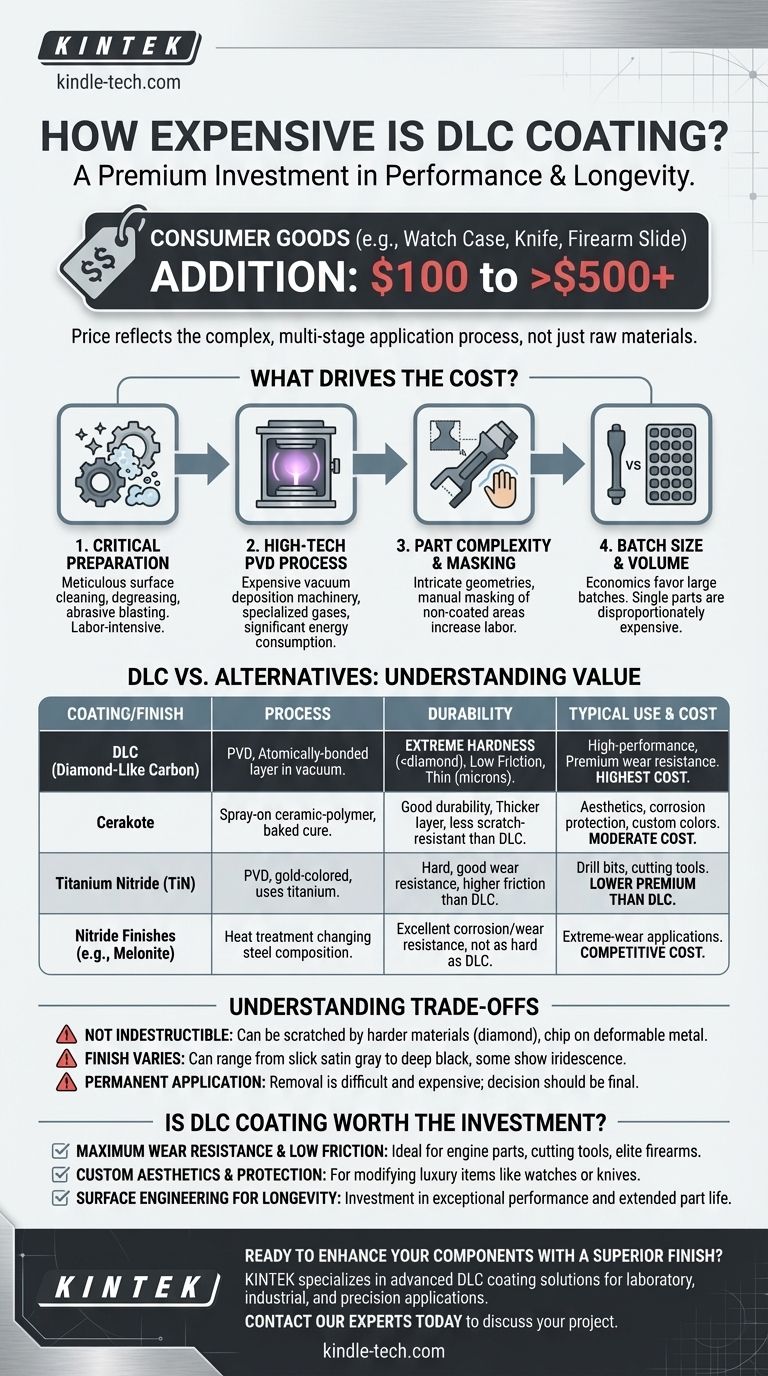
Related Products
- Custom CVD Diamond Coating for Lab Applications
- CVD Diamond Cutting Tool Blanks for Precision Machining
- RF PECVD System Radio Frequency Plasma-Enhanced Chemical Vapor Deposition RF PECVD
- Hydrophilic Carbon Paper TGPH060 for Battery Lab Applications
- High-Purity Titanium Foil and Sheet for Industrial Applications
People Also Ask
- Why RF sputtering is better than DC sputtering? The Ultimate Guide to Material Deposition
- How does CVD work? A Step-by-Step Guide to Chemical Vapor Deposition
- How does the general process of Chemical Vapor Deposition (CVD) work? Mastering Thin-Film Uniformity
- Why is high-purity nitrogen used as a carrier gas in the AACVD process? Achieve Precision Film Growth and Safety
- What gases are typically used in the High-Density Plasma CVD (HDP-CVD) process? Optimize Your Film Deposition
- What is chemical Vapour deposition in CNT? Master the Dominant Method for Scalable CNT Synthesis
- How are lab-grown diamonds created by CVD? Unlock the Science of Man-Made Gems
- What is silicon carbide chemical vapor deposition? The Key to High-Performance Semiconductor Manufacturing
